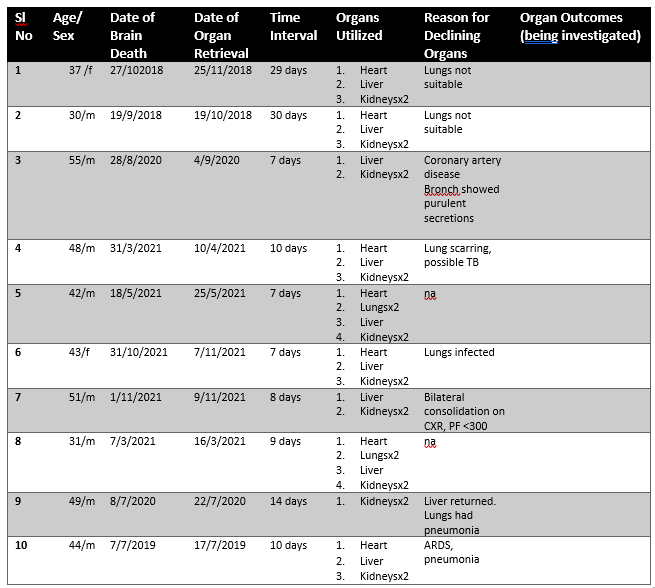Late organ procurement as much as 30 days after brain death
Haamid Siddique1, Jihad Mallat1.
1Critical Care Institute, Cleveland Clinic Abu Dhabi, Abu Dhabi, United Arab Emirates
Introduction: There is a worldwide shortage of organs for transplantation. In cases of deceased organ donation, it is common practice to go immediately for organ retrieval surgery once brain death is declared and consent is obtained. The time duration between brain death declaration and organ retrieval surgery is often as short as 24-48 hours and rarely exceeds 5 days. The prevailing opinion is the longer the wait time, the higher the chance of losing the organs due to instability of the deceased organ donor. There is also a concern that organ viability may be jeopardized by longer wait times. We present here a series of 10 cases of utilized organ donors, where organ procurement surgery occurred more than 1 week after consent was obtained.
Methods: We did a retrospective chart review of all cases of deceased organ donation after death by neurological criteria at our hospital, Cleveland Clinic Abu Dhabi, between October 1, 2017 to October 1, 2022. We identified 10 cases where the organ procurement surgery had to be conducted 7 or more days after declaration of brain death. We then proceeded to study these cases systematically looking at the reasons for the delays in surgery, the number and type of organs utilized, the reasons for declining organs and the short and intermediate term outcomes of transplantation, if transplantation occurred at our hospital.
Results: The median age of our donors was 43.5 years [37-49], median time interval between declaration of brain death and organ retrieval surgery was 9.5 [7-14] days (min: 7 days, max:30 days). Average organ yield was 4.0 per donor. The most commonly utilized organ was the kidney(n=10) followed by liver(n=9). The least common utilized organ was the lung(n=2). See Table for details. Study is ongoing.

Conclusion: Our study demonstrates that, in extenuating circumstances, it is possible to preserve viability of donor organs for several weeks after brain death and successfully perform organ procurement surgery.